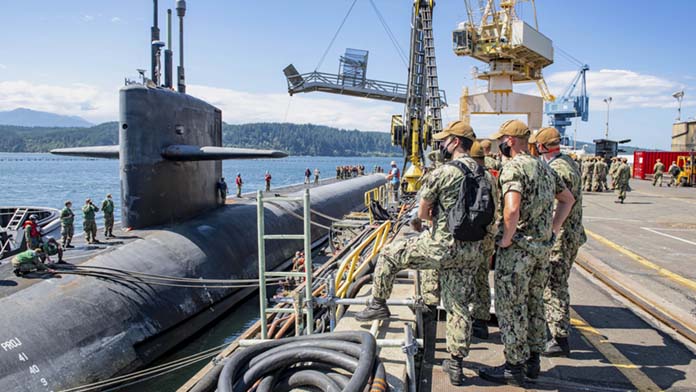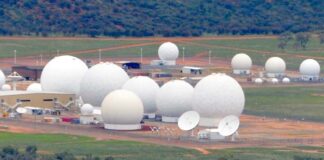University bosses are already racing to support the government’s ambitions for nuclear submarines under the AUKUS agreement.
Universities Australia, representing uni managements across the country, has declared their enthusiasm to be “a crucial partner of government in Australia’s defence transformation.”
Presently, Australia has only one nuclear facility located in Lucas Heights in Sydney. Consequently, there is not the large workforce with the necessary qualifications to run nuclear submarines.
“At every stage of the process—from acquisition to construction to disposal—the project hinges on the skills and expertise of university-educated professionals,” stated Viki Thomson, Chief Executive of the Group of Eight, including the country’s richest universities.
The aim of training the next generation for AUKUS is already creeping into the education system, inadvertently moulding students into instruments of warfare. Brian Schmidt, Vice-Chancellor of ANU, told the Submarine Institute of Australia Conference last year that “Starting today we need to set a 14-year-old schoolgirl on the path to be captain of Australia’s first nuclear-powered submarine.”
This plan has already been set in motion through initiatives like the Nuclear-powered Submarine Propulsion Challenge, aimed at high school students in years 7-12. This will see high schools provided with teaching materials by the Defence Department and students encouraged to compete for the chance to tour a naval base.
By implementing these measures, the education system and the military are working together to cultivate a new generation of soldiers, furthering the drive towards war.
Since the Dawkins Reforms to tertiary education in 1987, government funding as a proportion of university income has decreased from 89 per cent to 35-40 per cent. This has pushed universities to seek alternative sources of funding, including from arms manufacturers. Group of Eight Universities currently invest approximately $70 million annually in defence research and development.
The militarisation of the university system has been going on for years, with institutions such as the University of Melbourne, Sydney, Adelaide, South Australia, RMIT, Flinders University, and ANU establishing partnerships or receiving funding from arms manufacturers like Lockheed Martin, BAE Systems, Raytheon, and Boeing. Universities’ involvement in AUKUS is an extension of this trend.
Funding
The most recent federal budget announced $127 million in funding and additional places for 4000 students in AUKUS-related courses and programs.
The first batch of students in these courses is scheduled to commence next year. The Group of Eight asserts that this funding in STEM disciplines “will help generate that workforce; especially, to support Defence priorities”, and help ensure that “Australia’s required sovereign capability can be realised and on time”.
In addition to these student places, universities have made AUKUS a top priority, with the Go8 emphasising research and education in the field of nuclear energy, while directing graduates towards military careers and a war-oriented agenda. Course offerings at universities across the country are rapidly declining, with less and less choice being given to students. Now, however, they are deciding to create new courses specifically designed to contribute to the AUKUS workforce.
While other departments are losing staff, ANU’s submission to the Government’s defence Strategic Review declared that “the current academic workforce is too small to meet the increasing demands for formal training and education that will be required by AUKUS”.
The Australian National University is introducing a new major in nuclear engineering, focusing on defence capabilities, after cutting other engineering majors such as biomedical engineering. The University of Adelaide is adapting its masters program in marine engineering and radiation management course, catering to the specific requirements of a nuclear submarine capability. A new partnership between Flinders University, the University of Manchester and the University of Rhode Island in the US is designed to bolster its nuclear masters program.
Vice Admiral Jonathan Mead has also confirmed that Royal Australian Navy officers are currently undergoing nuclear reactor training in the US and are concurrently enrolled in programs at UNSW and ANU.
AUKUS and the nuclear submarine deal is another step in furthering the drive to war against China. When wars occur it is the working class who will be sent to fight a war decided on by the ruling class.
This push to assist AUKUS by Australian universities shows that the façade of universities as a place to learn and think critically comes second to ruling class priorities such as creating soldiers who will fight and ultimately die in wars to protect their profits.
We need to oppose the militarisation of the university system and demand more government funding for socially useful studies in renewable energy, zero carbon industries, tackling poverty or building public housing, not preparations for war.
By Mickey Throssell






